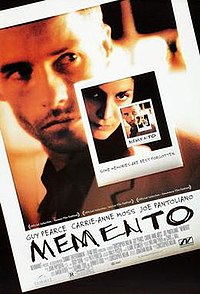 Memento is a 2000 psychological thriller film written and directed by Christopher Nolan, adapted from his brother Jonathan's short story "Memento Mori". It stars Guy Pearce as Leonard Shelby, a former insurance fraud investigator searching for the man he believes raped and killed his wife during a burglary. Leonard suffers from anterograde amnesia, which he contracted from severe head trauma during the attack on his wife. This renders his brain unable to store new memories. To cope with his condition, he maintains a system of notes, photographs, and tattoos to record information about himself and others, including his wife's killer. He is aided in his investigation by Teddy (Joe Pantoliano) and Natalie (Carrie-Anne Moss), neither of whom he can trust.
Memento is a 2000 psychological thriller film written and directed by Christopher Nolan, adapted from his brother Jonathan's short story "Memento Mori". It stars Guy Pearce as Leonard Shelby, a former insurance fraud investigator searching for the man he believes raped and killed his wife during a burglary. Leonard suffers from anterograde amnesia, which he contracted from severe head trauma during the attack on his wife. This renders his brain unable to store new memories. To cope with his condition, he maintains a system of notes, photographs, and tattoos to record information about himself and others, including his wife's killer. He is aided in his investigation by Teddy (Joe Pantoliano) and Natalie (Carrie-Anne Moss), neither of whom he can trust.This feature is often used to show the distinction between plot and story. The film's events unfold in two separate, alternating narratives—one in color, and the other in black and white. The black and white sections are told in chronological order, showing Leonard conversing with an anonymous phone caller in a motel room. Leonard's investigation is depicted in five-minute color sequences that are in reverse chronological order. As each scene begins, Leonard has just lost his recent memories, leaving him unaware of where he is or what he was doing. The scene ends just after its events fade from his memory. By reversing the order, the spectator is unaware of the preceding events, just like Leonard. By the film's end, the two narratives converge in a single sequence that begins as black and white and fades into color.
Leonard Shelby (Guy Pearce) wears expensive, European tailored suits, drives a late model Jaguar sedan, but lives in cheap, anonymous motels, paying his way with thick wads of cash. Although he looks like a successful businessman, his only work is the pursuit of vengeance: tracking and punishing the man who raped and murdered his wife. His suspicions dismissed by the police, Leonard's life has become an all-consuming quest for justice.
The difficulty, however, of locating his wife's killer is compounded by the fact that Leonard suffers from a rare, untreatable form of memory loss. Although he can recall details of life before his "accident", Leonard can't remember what happened fifteen minutes ago, where he is, where he's going or why. A former insurance investigator, Leonard is keenly aware of his handicap. Moreover, he's got the discipline to compensate as well as the motivation-the cruel memory of his beloved wife's last moments. Haunted by what he's lost, he's re-built his life out of index cards, photographs, file folders, charts, tattoos and obsessive habits that stand in for memory, fixing him in space and time and connecting him to his mission.
Out of necessity, Leonard must rely on others despite being thoroughly ill-equipped to assess either their motives or basic decency. Leonard remembers his past-up to a point. But just who has Leonard become since losing the ability to hold together the fragments of himself? "Memento" mines this psychological terrain, using non-linear film narrative to mirror Leonard's own effort to interpret the random pieces of evidence he hoards. The murder, rewound in the opening frames, we discover, is logically the endpoint of Leonard's story. What we learn comes from a point earlier in time, a few moments and a few sentences prior to what we've already been shown. As Leonard's story unfolds, the meaning of events changes. Allies, enemies, victims, victimizers swap place almost kaleidoscopically.
Memento premiered on September 5, 2000 at the Venice Film Festival to critical acclaim and received a similar response when it was released in theaters on December 15, 2000. Critics especially praised its unique, nonlinear narrative structure and themes of memory, perception, grief, self-deception, and revenge. The film was successful at the box office and received numerous accolades, including Academy Award nominations for Original Screenplay and Editing.
No comments:
Post a Comment